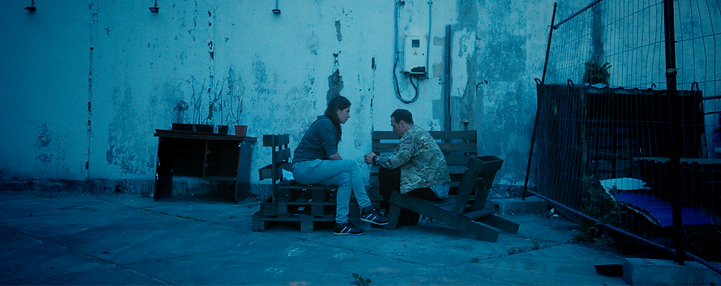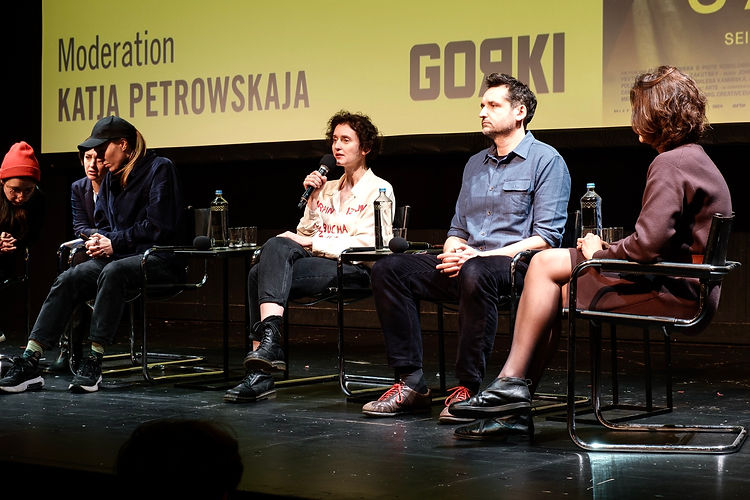
PEOPLE & PLACES
STORIES FROM UKRAINE
The Cast
UKRAINIAN PROTAGONISTS AND THEIR STORIES

KATYA
She comes from Kharkiv. She was a student of international relations in Kyiv when protests started. One day, a crowd of people carried her off with them to the Square. From that day on, she lived at the Maidan – the Independence Square – until the end of the protests. Together with other students, she built barricades and prepared Molotov cocktails. She joined one of the first volunteer battalions when the war broke out. She spent a year and a half fighting. Since 2016, she has worked for the East Ukrainian Center for Civil Initiatives documenting war crimes. Since the beginning of Russia’s invasion of Ukraine on February 24, 2022, she has been fighting in the ranks of the Ukrainian Army.

OXANA
Theater and film actress. She graduated from the University of Arts in Kharkiv. In December 2013, she joined the protesters at the Maidan. She demanded changes in Ukrainian theaters, where corruption and lawlessness were commonplace, and plays, instead of dealing with issues relevant to Ukraine, were copies of Russian romantic comedies. Since 2014, she has acted in independent theaters, creating dozens of roles cooperating with many social and cultural organizations. Oxana starred in Natalya Vorozhbyt’s Bad Roads and Maryna Er Gorbach’s Klondike. Currently, she is an actress at Teatr Powszechny in Warsaw.

SLAVIK
Originally from the western part of Ukraine. After the outbreak of the war in Donbas, he suspended his acting studies at the Kharkiv University of Arts to volunteer for the army. He ended up at the Donetsk airport, where the bloodiest struggle occurred. In just seven days of constant shelling, he witnessed the death of most of his comrades. He was taken prisoner and eventually released due to his father’s intervention. In recent years, Slavik studied law, and in February 2022, he was commissioned as an officer in the Ukrainian Army. Since Russia’s current invasion of Ukraine began, he has been fighting in its ranks.

RODION
A native of Donetsk, he is a stylist and film costume designer. In 2014, he participated in the pro-Ukrainian protests in Donetsk. Still, when the situation in Donbas began to escalate, he left for Kyiv, where he studied at the Theatre Academy. Apart from his artistic activity, Rodion is also involved in the LGBTQ community in Ukraine. A few days after the outbreak of war, he went to Lviv, where he has been sewing military uniforms and helping organize humanitarian aid for refugees.

ROMAN
Hails from Lviv. Actor of the Lesya Ukrainka Theater and the National Theater in Lviv. In 2015, he was called to military service. Since he did not want to fight with a weapon in hand, he became a paramedic and spent a year and a half on the front line. He pulled wounded soldiers from the battlefield, many of whom he managed to save, risking his life. He was confronted with death almost every day. After returning from the war, he struggled with post-traumatic stress disorder. Since the beginning of the Russian invasion of Ukraine, he has been a paramedic in the ranks of the Ukrainian Army.

Directed by
ELWIRA NIEWIERA & PIOTR ROSOŁOWSKI


ELWIRA NIEWIERA
Polish director and screenwriter of the well-known documentary films DOMINO EFFECT, THE PRINCE AND THE DYBBUK, and THE HAMLET SYNDROME. Her artistic work focuses primarily on political, social, and cultural transformations in Eastern Europe. Winner of many international awards, among others Grand Prix-Semaine de la Critique for the Best Film at 75th Locarno Film Festival, Best Documentary on Cinema at the 74th Venice Film Festival, Polish Film Academy Award for Best Documentary, Golden Dove at DOK Leipzig Film Festival, Young German Cinema Award 2019 and the Chicken & Egg Award 2021. Elwira is a member of the European Film Academy.
PIOTR ROSOŁOWSKI
Polish director, screenwriter, and cinematographer based in Berlin. He graduated from the Katowice Film School and was awarded an Academy of Media Arts scholarship in Cologne. Piotr co-directed together with Elwira Niewiera already three successful feature documentaries: Domino Effect prized at the Krakow Film Festival and DOK Leipzig, The Prince and the Dybbuk awarded with the Lion for Best Documentary on Cinema at the 74th Venice Film Festival, and The Hamlet Syndrome honored with Grand Prix Semaine de la critique at the 75th Locarno Film Festival. Piotr also works as a director of photography, he shot many awarded feature and short films, among them: On the line dir. Reto Caffi – Academy Award-nominated short fiction, Rabbit a la Berlin dir. Bartek Konopka – Academy Award-nominated short documentary, and The wall of Shadows dir. Eliza Kubarska – nominated for the German Camera Award and honored with the annual prize of the Polish Society of Cinematographers.

INTERVIEW
WITH THE FILMMAKERS
What inspired you to make this movie?
Why did rehearsals for Hamlet seem like the right tool for you to talk about the current condition of Ukrainian society?
ELWIRA
On the one hand, we wanted to draw attention to the ongoing war in eastern Ukraine since 2014. The war has completely faded into oblivion in recent years, although fighting continued and people died every day. On the other hand, we were interested in the fate of the young generation, born after 1989 in free and independent Ukraine. Their lives influenced by of the 2014 Revolution of Dignity and the war have entirely changed. Twenty- or thirty-year-olds were forced to make very difficult existential choices, paying a high price for their commitment. And then, another inspiration emerged, namely the desire to look at which themes from Shakespeare’s Hamlet resonate with the experiences of the young generation of Ukrainians scarred by the war. At that time, we knew that a theatrical performance would become a narrative thread of the film.
PIOTR
With every new film project, we ask ourselves how to create the narrative structure of our movie. Fascinated by Ukraine’s “Maidan generation,” we came to the conclusion that the archetypal figure of Hamlet – a twenty-something boy whose life suddenly collides with a brutal struggle for power in his homeland – is a parallel describing the dilemmas of a large part of the politically engaged young Ukrainian generation. With The Hamlet Syndrome, it was also clear from the beginning that we didn’t want to make a journalistic film. We didn’t want to record interviews with our protagonists in which they would talk about their experiences during the revolution and the war in Donbas. Therefore, we took on the challenge of creating a theatrical play based on elements of Hamlet, in which the participants could address the traumatic events of recent years.
What was the biggest challenge foryou in making this film?
ELWIRA
The process of finding the cast took almost two years. We met about 80 young, socially active people who formed volunteer battalions, organized humanitarian aid, or were forced to flee from Donbas. Many of them went through the hell of war, facing their trauma and trying to find their place in life. At that stage of the film’s development, we already knew that we wanted our characters to take part not only in the film but also in a play. We wanted to create a situation in which our characters, on a theater stage, could go through a process of reflection on what they had experienced in recent years. However, many people we met were not emotionally ready for such a task. It took us a very long time to find a team who had undergone therapy and could get back to their war experiences on stage. Our characters’ had different motivations for participating in the film and play. Still, all of them, without exception, wanted the world to know about what they experienced in the war as the soldiers they never wanted to be!
While making the film, did you ever feel the coming of war? Were the rehearsals not only reckoning with the past but also a preparation for the terrible future that is currently happening in Ukraine?
PIOTR
To be honest, none of us expected such a development of events, i.e., a full-scale invasion of Ukraine by Russia. However, some of our characters’ reckoned that the war might spill over from Donbas to the whole country at some point. Indeed, our characters’ war experiences made them immune to the romanticized view of war. Many of them have experienced all its horrors firsthand. One of our heroines, Katya, who fought in the Ajdar battalion in 2014 and 2015, said of herself, “I am not a soldier, I am just a woman at war, that is, someone who was forced to pick up a gun.” Katya’s story, like the stories of other heroes, comes full circle. Again, one has to return to the front or leave one’s home and flee, just like Rodion, who in 2014 was a refugee from Donbas in Kyiv, and today is a refugee from Kyiv in Lviv.
Were you able to be present at
rehearsals at all times, or were there any moments when the actors or the director preferred to remain in their intimate circle?
ELWIRA
Director Roza Sarkisian built the play’s structure during rehearsals based on conversations with our characters. We were present during the entire 40-day rehearsal process. In the film, however, we primarily used footage shot in the first two weeks when our characters first shared their stories. These were the most emotional moments. For all of them, the theater stage became a tribune from which they could share their experiences and shout out their grievances and problems.
How did your project change over time? What were your initial goals, and how did these goals change when confronted with reality?
PIOTR
Our initial goals didn’t change much. Of course, before we started shooting, we weren’t sure how the process of theatrical rehearsals would go. We didn’t know how much of the footage from preparations to the play we would use and to what extent scenes from characters’ lives would fill this movie. However, just a few days after we started shooting in the theater, we felt that all the characters were ready to work even with difficult and painful emotions. The final of the process was a great unknown for us. We also didn’t know how relationships between the characters would develop during their work together on stage. The film makes it clear that there were often various conflicts within the group. Ultimately, it’s typical for a documentary that you never know how the shoot will turn out or where it will all lead us. What is unique about this film is that two independent projects were created in parallel: the H-Effect play, directed by Roza Sarkisian, and our documentary film.
What is the life of the stars of the film like these days?
ELWIRA
Since Russia’s attack on Ukraine on February 24, 2022, Katya, Slavik, and Roman have been fighting in the ranks of the Ukrainian Army. They are in hell again, fighting for their country and freedom. With our film, we can experience firsthand what this means. Rodion, a stylist and costume designer, sews military uniforms in Lviv. Oxana, in turn, has emigrated to Poland. She is an actress at the Teatr Powszechny theater and organizes humanitarian aid.
